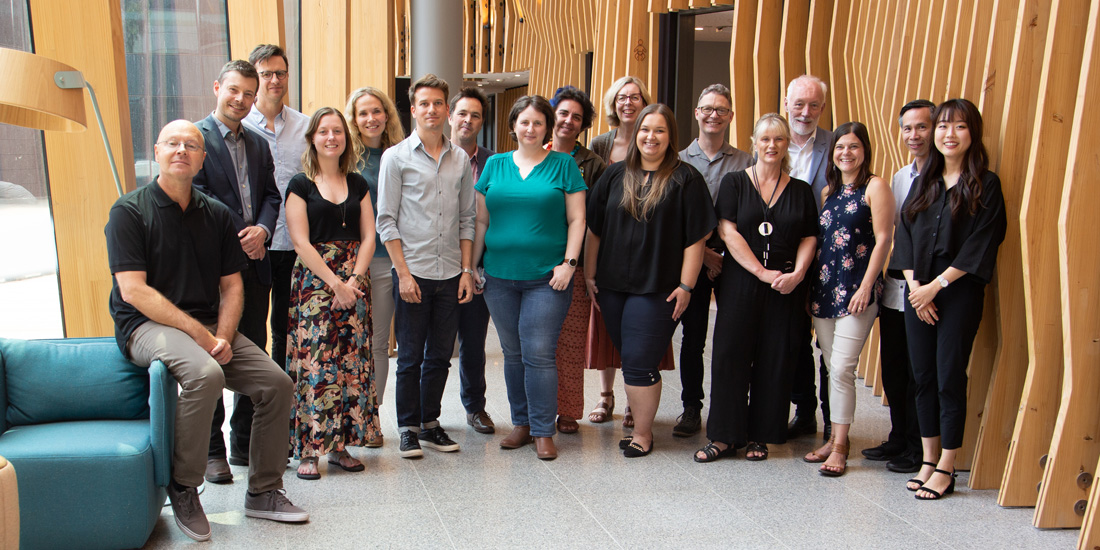 Wellcome Trust grant recipients. Photograph taken before the COVID-19 outbreak in Australia.
Wellcome Trust grant recipients. Photograph taken before the COVID-19 outbreak in Australia.
Australia’s leading role in youth mental health research has been recognised through grants of AU$11.9 million from the UK-based Wellcome Trust, Australia’s health minister the Hon. Greg Hunt announced today.
The funding will enable Orygen and the Centre for Youth Mental Health at the University of Melbourne to deliver three major projects designed to better predict the onset and modernise the treatment of the early stages of psychosis in young people.
Minister Hunt said the funding would further enhance Australia’s position as global research leaders in mental health, particularly in the areas of early intervention for psychosis and youth mental health.
“Innovations, conceived, led and guided by Orygen over a 30-year period, including early psychosis programs, the headspace enhanced primary care model, and other multidisciplinary youth mental health models have been directly adopted or adapted in more than 15 countries and hundreds of locations worldwide,” Minister Hunt said.
“The Australian Government is committed to improving mental health outcomes for young people and has continued to greatly expand and strengthen the national platform of youth mental health care across the country through headspace and the early psychosis system of care.”
The psychosis research funding follows Wellcome awarding $280,000 in research grants to four of Orygen’s young and emerging research leaders earlier this month to improve understanding of depression and anxiety in young people and improve treatments.
Dr Lynsey Bilsland, Deputy Head of Programme, Innovations, at Wellcome said Wellcome was delighted to be partnering with Orygen. “Orygen is a world-leading centre in youth mental health and early psychosis. They share the vision of Wellcome Innovation’s Psychosis Flagship to improve outcomes for patients with psychosis,” Dr Bilsland said.
“Our support for these three key programs has the potential to transform the diagnosis and treatment of patients. It will also lead to the establishment of a dedicated clinical registry and research network, which will allow for a more streamlined approach to facilitate, support and conduct large clinical trials in early psychosis. Early intervention is key to mitigate the impact of psychosis and, through these programs, we will gain vital insights that we hope will enable us to significantly improve the lives of patients.”
Orygen’s executive director, Professor Patrick McGorry, said he was extremely grateful to Wellcome for its serious investment in Australian mental health research. “Combined now with the major research grant support we receive from the National Institute of Mental Health in the US, it reflects the cutting-edge nature of our work and shows that the quality of Australian mental health research contributes strongly to Australia’s well-deserved reputation as a world leader in medical research.” Professor McGorry said.
“Orygen has now secured a strategic partnership with Wellcome through being recognised as a flagship partner and this, combined with the series of grants approved, is another demonstration of Australia’s competitiveness at attracting international research funding. These grants from Wellcome will fund much-needed early psychosis research and help improve outcomes for young people.
“Disruptions to young people’s development pathways have long-term impacts on their educational outcomes, their physical health, employment and relationships. The COVID-19 pandemic is hurting young people disproportionately, which underlines the need for pre-emptive action to reduce these impacts.
“Psychotic illnesses cost Australia $5 billion a year (1) so it’s incredibly important that we get better at predicting and treating symptoms when they first emerge.”
Wellcome has provided $7 million for Orygen’s randomised controlled trial (RCT) of cannabidiol as a treatment for young people experiencing early psychosis.
Cannabidiol is one of hundreds of compounds found in the Cannabis sativa plant. It is non-addictive and is being increasingly used to treat a range of medical conditions including epilepsy and Parkinson’s Disease as well as anxiety and schizophrenia.
The project’s chief investigator, Professor Paul Amminger, said Wellcome’s funding would allow researchers to test cannabidiol for the first time in the ultra-high risk phase of psychosis disorder.
“We know that cannabidiol can reduce psychotic symptoms in people with schizophrenia who do not fully respond to conventional antipsychotic medication,” Professor Amminger said.
“The study aims to answer an important clinical question: can subthreshold psychotic manifestations be effectively treated with cannabidiol?”
Wellcome has also committed $2.9 million to fund the establishment of the world’s first clinical registry for early psychosis and to set up a clinical registry and translation network.
Orygen’s Associate Professor Andrew Thompson will oversee the rollout of the projects via the Australian Early Psychosis Collaborative Consortium (AEPCC).
“The overall project – AEPCC, the clinical registry and translation network – will enable us to better understand the outcomes of young people with psychosis in Australia,” Associate Professor Thompson said.
A third project was granted $2 million to develop a method for better predicting which young people will experience persistent psychotic experiences or progress to a psychotic disorder.
Professor Barnaby Nelson, head of Orygen’s ultra-high risk for psychosis research program which has transformed research in schizophrenia and psychosis over a 25 year period, said the funding would allow his team to build upon new research findings published last year in World Psychiatry.
“That preliminary study provided proof of concept – our model of psychosis risk found several connections that hadn't been identified before,” Professor Nelson said.
“Now with this new grant we can test out the model on a larger sample to see if it will be useful for prediction purposes.”
1. Neil AL, Carr VJ, Mihalopoulos C, et al. 2014. Costs of psychosis in 2010: findings from the second Australian National Survey of Psychosis. Aust N Z J Psychiatry. 48(2):169-82.